Posts for Tag: interactive
Shall We Play A (Market Timing) Game?
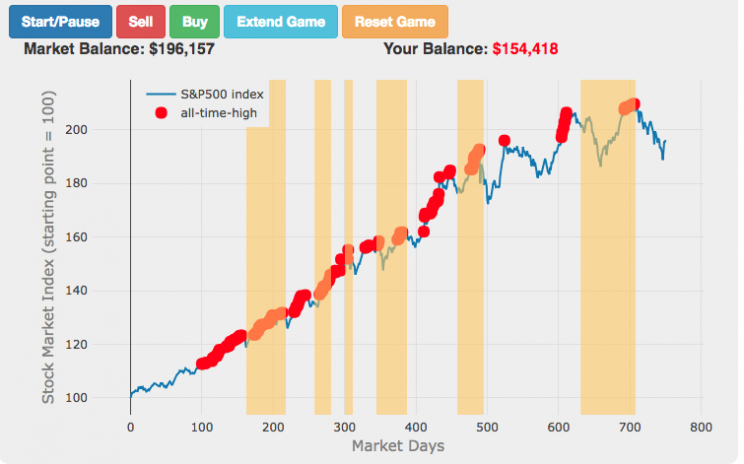

The Market Timing Game simulation is premised on the idea that buying-and-holding index investing and index funds are a no-brainer investment strategy and market timing (i.e. trying to predict market direction and trading accordingly) is a less than optimal strategy. The saying goes “Time in the market not timing the market”. In this simulation, you are given a 3-year market period from sometime in history (data starts January 1, 1950 and goes through the most recent market price, as prices are updated daily) or you can run in Monte Carlo mode (which picks randomly from daily returns in this period) and you start fully invested in the market and can trade out of (and into) the market if you feel like the market will fall (or rise). The goal is to see if you can beat the market index returns.
(more…)
¿Cuánto tardarías en contar hasta un millón?
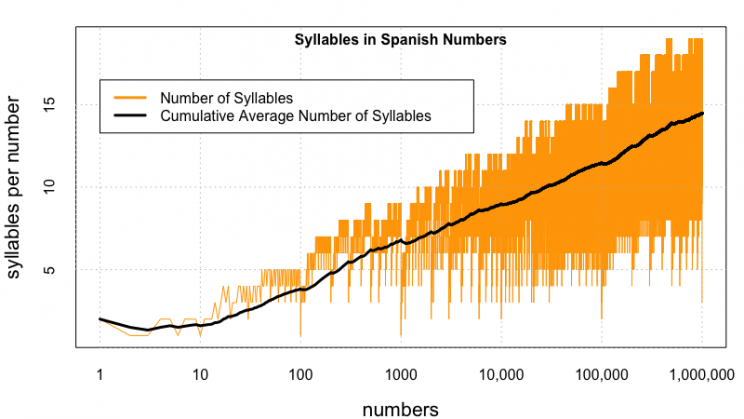
Disculpe(n) mi pobre español. Utilicé google translate para escribir esto en español.
Aquí está la calculadora que calculará cuánto tiempo lleva contar un millón (o números mayores) en español.
(more…)
Demographic Characteristics of US Voters (2016)
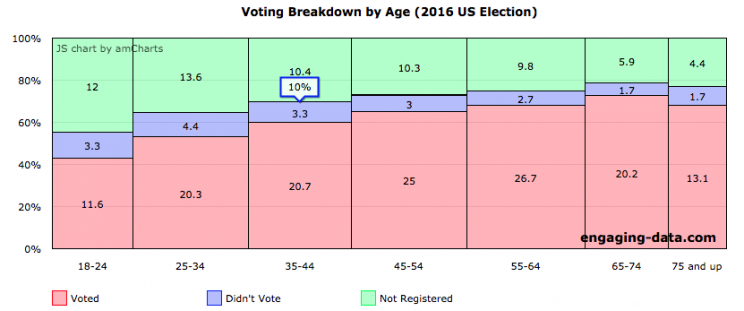
If you need to register to vote, please visit Rock the Vote to get registered in your state.
US politics has more than a few issues, which have been highlighted by the current situation in Washington DC. The protests and greater political awareness from high school students and young adults is a positive sign for democracy, but it needs to be accompanied by increased rates of voting from this demographic. I thought it would be interesting to explore rates of voting in the US across different demographic groups (age, education, income, race). This data is from the 2016 US presidential election.
Total eligible US voting population was about 224 million in 2016 and the overall rate of voting among this population was 61.4%.
The first graph shows the distribution by age. As we can see, the rate of registration and voting increases with age. It is hard to engage young people to be interested in voting but hopefully they will do so in greater numbers this upcoming election.
Counting to One Million, One Billion or One Trillion in Spanish

There was lots of interest in the calculator to estimate counting time (in English) to one million, one billion and up to one trillion. I decided to do the same for other popular languages (Spanish). Here is the calculator that will calculate how long it takes to count to one million (or larger numbers) in Spanish. If you’d like to see this in Spanish click here.
(more…)
March Madness Matchup Visualizer
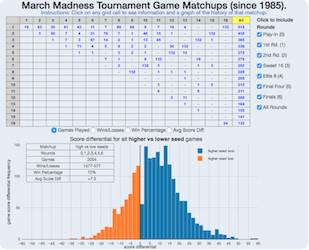
It’s March and for those who follow sports, that means college basketball and March Madness. The tournament is mainly interesting because of two reasons: (1) filling out brackets and (2) watching and hoping for upsets . This interactive March Madness matchup visualizer helps do both of these things by showing you the history of the tournament (since 1985 when the tournament expanded to 64 teams) in terms of matchups between teams with different seeds (1 through 16 in four regions).
(more…)
How long does it take to count to 1 million? 1 billion? 1 trillion?
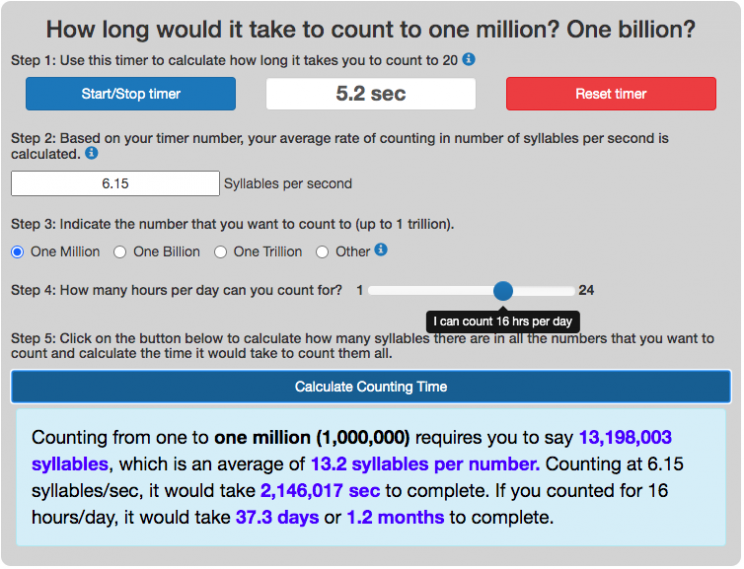
My son likes large numbers (like septillion, googol and googolplex) and once asked me how long it would take to count to septillion (which is 1 followed by 24 zeros). I told him it would take longer than the age of the universe to do that, so he started working his way down. He asked me about counting to one million. I did a little math (assuming one number per second) and got about 11-12 days . . . but then thought, the large numbers (like 658,243) take more than a second to say.
Looked on the web a little to see if anyone else had done a more sophisticated calculation. Lots of calculations were like my own (assuming one number per second). Others acknowledge that it would take longer for large numbers and made assumptions about what that would be. But nothing definitive, so I thought I’d make one. This counting calculator is based on the number of syllables in every number and counts all the syllables you’d have to pronounce in order to count from one to one million (or other numbers).
Shall We Play A (Market Timing) Game?


The Market Timing Game simulation is premised on the idea that buying-and-holding index investing and index funds are a no-brainer investment strategy and market timing (i.e. trying to predict market direction and trading accordingly) is a less than optimal strategy. The saying goes “Time in the market not timing the market”. In this simulation, you are given a 3-year market period from sometime in history (data starts January 1, 1950 and goes through the most recent market price, as prices are updated daily) or you can run in Monte Carlo mode (which picks randomly from daily returns in this period) and you start fully invested in the market and can trade out of (and into) the market if you feel like the market will fall (or rise). The goal is to see if you can beat the market index returns.
(more…)
¿Cuánto tardarías en contar hasta un millón?

Disculpe(n) mi pobre español. Utilicé google translate para escribir esto en español.
Aquí está la calculadora que calculará cuánto tiempo lleva contar un millón (o números mayores) en español.
(more…)
Demographic Characteristics of US Voters (2016)

If you need to register to vote, please visit Rock the Vote to get registered in your state.
US politics has more than a few issues, which have been highlighted by the current situation in Washington DC. The protests and greater political awareness from high school students and young adults is a positive sign for democracy, but it needs to be accompanied by increased rates of voting from this demographic. I thought it would be interesting to explore rates of voting in the US across different demographic groups (age, education, income, race). This data is from the 2016 US presidential election.
Total eligible US voting population was about 224 million in 2016 and the overall rate of voting among this population was 61.4%.
The first graph shows the distribution by age. As we can see, the rate of registration and voting increases with age. It is hard to engage young people to be interested in voting but hopefully they will do so in greater numbers this upcoming election.
Counting to One Million, One Billion or One Trillion in Spanish

There was lots of interest in the calculator to estimate counting time (in English) to one million, one billion and up to one trillion. I decided to do the same for other popular languages (Spanish). Here is the calculator that will calculate how long it takes to count to one million (or larger numbers) in Spanish. If you’d like to see this in Spanish click here.
(more…)
March Madness Matchup Visualizer

It’s March and for those who follow sports, that means college basketball and March Madness. The tournament is mainly interesting because of two reasons: (1) filling out brackets and (2) watching and hoping for upsets . This interactive March Madness matchup visualizer helps do both of these things by showing you the history of the tournament (since 1985 when the tournament expanded to 64 teams) in terms of matchups between teams with different seeds (1 through 16 in four regions).
(more…)
How long does it take to count to 1 million? 1 billion? 1 trillion?

My son likes large numbers (like septillion, googol and googolplex) and once asked me how long it would take to count to septillion (which is 1 followed by 24 zeros). I told him it would take longer than the age of the universe to do that, so he started working his way down. He asked me about counting to one million. I did a little math (assuming one number per second) and got about 11-12 days . . . but then thought, the large numbers (like 658,243) take more than a second to say.
Looked on the web a little to see if anyone else had done a more sophisticated calculation. Lots of calculations were like my own (assuming one number per second). Others acknowledge that it would take longer for large numbers and made assumptions about what that would be. But nothing definitive, so I thought I’d make one. This counting calculator is based on the number of syllables in every number and counts all the syllables you’d have to pronounce in order to count from one to one million (or other numbers).
Recent Comments